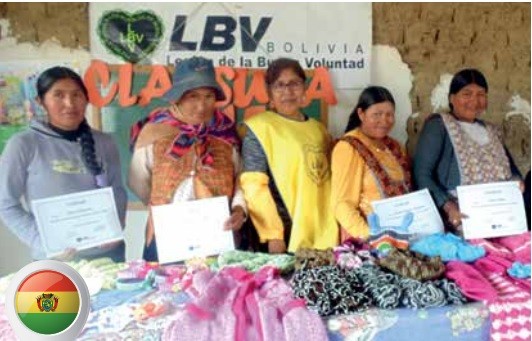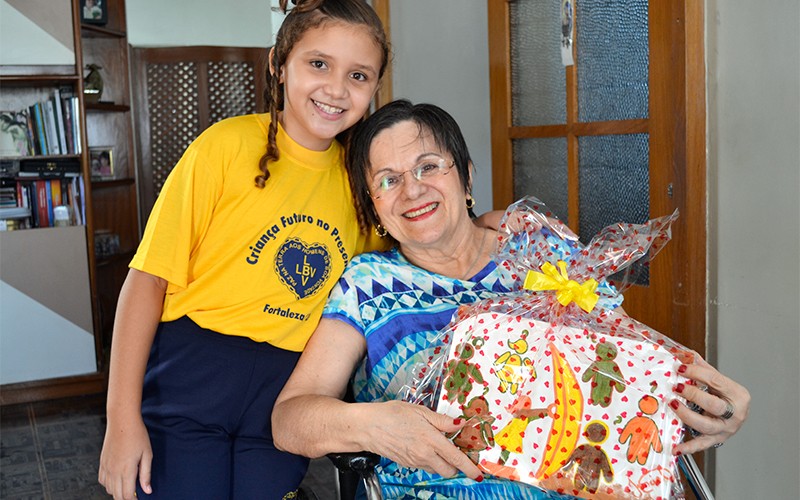Time for a new beginning
LBV’s programs help strengthen the protection of women
Ending gender-based violence is one of the major challenges on the global agenda for the upcoming years. In 2013, a study presented by the World Health Organization (WHO) revealed that 35 percent of women have been victims, at least once in a lifetime, of violence caused by their intimate partners, family members, acquaintances, or strangers.
That is why the Legion of Good Will works to fight this condemnable practice and to strengthen the protection of women. The LGW also promotes awareness campaigns and social mobility initiatives regarding this issue. LGW professionals—consisted of a multidisciplinary team—assist women who have suffered any kind of assault through psychological assistance or referral to specialized facilities, when necessary.
Defeating domestic violence
Living on the street is a reality for many women. This is exactly what Guadalupe*—who lives in Montevideo, Uruguay—went through. She met her husband in 2006, and married him three years later. After her son Luiz* was born she had to quit her job in order to take care of the baby and her home. That was when the violence began; first, it was psychological, not to mention the indifference her husband felt towards Luiz.

Later on, after her partner started taking drugs, the situation worsened and Guadalupe’s physical integrity was threatened: “He forced me to have sex with him, then he would hit me in the head with a heavy object. . . . Besides that, he turned my home into a place for women, drugs, and alcohol.”
To avoid experiencing more embarrassment and pain, the mother ran away from her own home with her son and because she was in dire financial straits, she ended up living on the streets with Luiz for four months. She is a fighter and soon got a job opportunity and found the helping hand of the LGW of Uruguay that gave the boy a chance to study at the José de Paiva Netto Educational and Cultural Institute. Therefore, she was able to find some peace of mind while she worked to provide for her family.
Guadalupe is a completely different person today. She says that she once again believes in better days. “Now, my 5-year-old son and I are happy. We have a new life. I’m doing well at work—I’m in the armed forces—and my son is well taken care of at the LGW’s school. I’m very happy to see that he is so happy and that our past is just that: the past.”
Gender inequality and exclusion

Amalia Apaza (first on the left) receives the certificate of technical training by the LGW.
Although the illiteracy rate in Bolivia has decreased, the problem still has the face of women. Three out of every 100 people are illiterate in the country and out of those, two are women. This is a consequence of exclusion and gender inequality. Amalia Apaza, 30, mother of two, is one of them. Born in the community of Humanata, in the province of Camacho, to a large family, she says that her parents used to say that studying was “only for men.” To them, explains Amalia, “women must only learn to do housework.”
At 16, she moved to La Paz, capital of Bolivia, and was overwhelmed by even more competitive social environments. “In my first jobs as a kitchen assistant, I suffered ill-treatment at the hands of my employers because of my lack of experience and, moreover, because I was very shy since I didn’t know how to read and write,” she recalls.
Humiliation continued even as a married woman. “My husband said that I wasn’t good for anything, that I didn’t help paying the bills, and that all I did was ask for money,” she said.
The tragic psychological violence cycle was interrupted in 2014, when Amalia, living in the Buena Vista settlement, in the city of El Alto (approximately ten kilometers from the country’s capital), learned of a group of youth and adult women attending literacy and technical training courses, at the location’s social service center, run by the Legion of Good Will.
“Little by little I learned different [knitting and crocheting] stitches and how to make a layette, and one day a woman saw my work and said that if I wanted she could take my products to her store and sell them. From then on, I’ve been selling my work, I always have orders,” she highlights.
The autonomy she gained also changed things at home: “My partner no longer humiliates me, and now I am able to help out at home financially. I learned to value myself as a woman, mother, and I do my best so my children don’t suffer what I did. I’m grateful to the LGW for the free courses, for this opportunity to learn, and thus improve our lives.”
GENDER-BASED VIOLENCE FIGURES
A study carried out by WHO*, in partnership with the London School of Hygiene & Tropical Medicine and the South African Medical Research Council, analyzed the prevalence of physical and sexual violence committed by intimate and non-intimate partners (family members, friends, acquaintances, and strangers) against women, and the effects of the violence on their health. Among other data, the work revealed that:
- Around 35% of women worldwide have experienced domestic violence or violence outside the family environment at some point in their life.
- 30% of women who have been in a relationship have experienced an intimate partner violence.
- Of the women that have suffered physical and/or sexual violence from their partners, 42% presented some kind of injuries, be it broken bones, pregnancy complications, and even mental disorder.
*Data from the 2013 report “Global and regional estimates of violence against women: prevalence and health effects of intimate partner violence and non-partner sexual violence.”
Ten Years of Progress

.
In 2016 Law 11.340/06, also known as the Maria da Penha Law—in a tribute to biopharmacist Maria da Penha Maia Fernandes—, will complete 10 years. On February 19, children assisted by the LGW in Fortaleza, Brazil, congratulated the woman who inspired the new piece of legislation that combats and prevents gender-based violence in the country. “[I’m] happy, because I know that you’re working on the issue of violence against women and teaching about this law to children. We tend to reproduce what we’ve been taught, the good things we’ve learned. The LGW is working in this direction. I feel truly honored to have my cause advocated through your actions. I’m very grateful to Paiva Netto for the work he’s been doing with children regarding education and citizenship. I’d like to thank him for divulging the Maria da Penha Law and for his commitment to implementing it,” the Brazilian activist stressed.
____________
* Fictitious names to protect the victims’ identity
